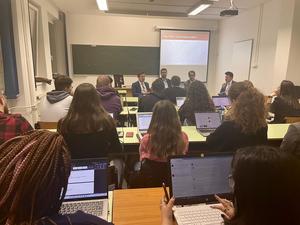After the recent midterm elections. the U.S. government is once again divided: Republicans are in control of the House of Representatives and a Democrat, Joe Biden, is occupying the White House. While divided government, a unique feature of American politics, is not new in Washington, it comes under increased scrutiny in times of crisis. How will it impact U.S. foreign policy, especially when it comes to Ukraine or great power competition with China? And how are divergent interests resolved, between the parties, between the chambers of Congress, and in Congress-versus-President issues?
Scott Frish, professor and chair of Political Science at California State University Channel Islands, Balázs Mártonffy, our director, and Tibor Mándi, our researcher and associate professor of the ELTE Faculty of Law adressed these critical questions in moderation of Máté Czene-Joó PhD candidate of ELTE Faculty of Law.
In his keynote professor Scott shed light on the challenges faced by legislation, including budget allocation due to the division of the Congress. On top of the divergence of interests, representatives also have to face enormous pieces of bills, omnibuses that either pass as a package or fail in whole. Earmarks offer some relief in this tied situation, however, longer-term matters like annual resource allocations can only be brodged by continuous resolutions.
The situation is also far from ideal within the parties. Nancy Pelosi's retirement brough divisions within the Democrats to the surface. But as the Squad on the left, so is the Freedom Caucus gaining influence on the right. With such internal divisions panelists predicted hard times for the Biden administration to pass any bills in the upcoming two years.
